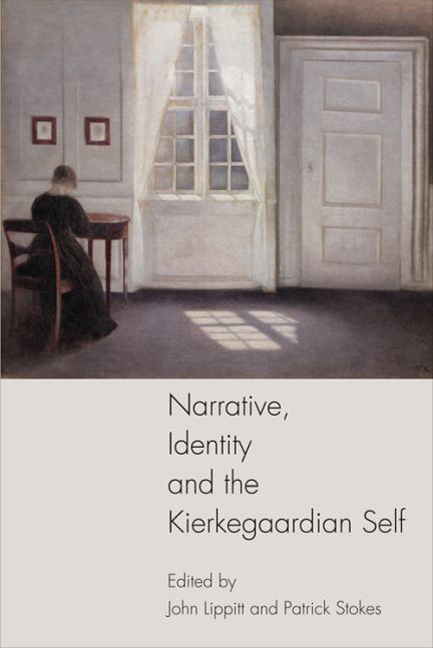Book contents
- Frontmatter
- Contents
- Acknowledgements
- Abbreviations
- Contributors
- Introduction
- 1 The Moments of a Life: On Some Similarities between Life and Literature
- 2 Teleology, Narrative and Death
- 3 Kierkegaard's Platonic Teleology
- 4 Narrative Holism and the Moment
- 5 Kierkegaard's Erotic Reduction and the Problem of Founding the Self
- 6 Narrativity and Normativity
- 7 The End in the Beginning: Eschatology in Kierkegaard's Literary Criticism
- 8 Forgiveness and the Rat Man: Kierkegaard, ‘Narrative Unity’ and ‘Wholeheartedness’ Revisited
- 9 The Virtues of Ambivalence: Wholeheartedness as Existential Telos and the Unwillable Completion of Narravives
- 10 Non-Narrative Protestant Goods: Protestant Ethics and Kierkegaardian Selfhood
- 11 Narrativity, Aspect and Selfhood
- 12 The Senses of an Ending
- 13 The End? Kierkegaard's Death and its Implications for Telling his Story
- Bibliography
- Index
3 - Kierkegaard's Platonic Teleology
Published online by Cambridge University Press: 15 September 2017
- Frontmatter
- Contents
- Acknowledgements
- Abbreviations
- Contributors
- Introduction
- 1 The Moments of a Life: On Some Similarities between Life and Literature
- 2 Teleology, Narrative and Death
- 3 Kierkegaard's Platonic Teleology
- 4 Narrative Holism and the Moment
- 5 Kierkegaard's Erotic Reduction and the Problem of Founding the Self
- 6 Narrativity and Normativity
- 7 The End in the Beginning: Eschatology in Kierkegaard's Literary Criticism
- 8 Forgiveness and the Rat Man: Kierkegaard, ‘Narrative Unity’ and ‘Wholeheartedness’ Revisited
- 9 The Virtues of Ambivalence: Wholeheartedness as Existential Telos and the Unwillable Completion of Narravives
- 10 Non-Narrative Protestant Goods: Protestant Ethics and Kierkegaardian Selfhood
- 11 Narrativity, Aspect and Selfhood
- 12 The Senses of an Ending
- 13 The End? Kierkegaard's Death and its Implications for Telling his Story
- Bibliography
- Index
Summary
There has been a good deal of discussion in recent philosophy of narrative theories of personal identity and of ethics. And there have been lively debates among Kierkegaard scholars about whether, and to what extent, Kierkegaard can be considered a narrative theorist, and the relevance of his thought to discussions of narrative in contemporary philosophy. In some of these discussions, though, there has been a tendency to consider the notion of narrative apart from the broader philosophical context in which it was introduced by the chief founders of modern narrative theory – Alasdair MacIntyre, Charles Taylor and Paul Ricoeur. For them – and particularly for MacIntyre – the understanding of the self in terms of narrative is part of a broader project to recover a teleological understanding of human nature and thus of ethics that has largely been lost in modernity. I will argue here that to understand Kierkegaard as a narrative thinker, we need to understand him too as advancing a teleological view of selfhood and ethics.
This is not uncontroversial. MacIntyre, in After Virtue, saw Kierkegaard not as a potential ally but as marking a stage on modernity's slide toward Nietzschean nihilism. MacIntyre bluntly asserted there that Kierkegaard ‘rejects any teleological view of human nature’ (2007: 54). He has, however, been much criticised for this, and has now himself retracted that claim. But if Kierkegaard is a teleological thinker, what kind of teleological thinker is he? I will argue here that Kierkegaard makes a compelling case for a kind of teleological thinking about the self and ethics which – although strikingly original in many ways – is essentially Platonic in structure.
I
In The Sickness Unto Death Kierkegaard describes a human being as ‘a synthesis of the finite and the infinite, of the temporal and the eternal, of freedom and necessity’ (SUD, 13/SKS 11, 129). Each of these polarities is, I think, a particular way in which to think about one basic polarity, between what I shall call our immanence and our transcendence. The former stands for our rootedness in the specificities of nature, society and history, our having a fixed, determinate nature, which sets limits to what we are and what we can do.
- Type
- Chapter
- Information
- Narrative, Identity and the Kierkegaardian Self , pp. 46 - 62Publisher: Edinburgh University PressPrint publication year: 2015

